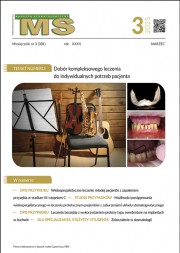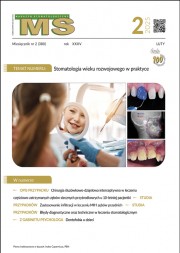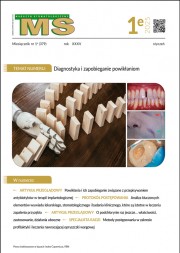
The phone is ringing
Doctor: Dental Surgery. How can I help you?
The mother of the patient: Hello, may I speak to a doctor, please?
Doctor: Yes, of course. What seems to be a problem, Madam?
The mother of the patient: Doctor, I would like to schedule an appointment for my son. About five years ago, he fell off the bike and knocked one of his teeth out. We went to the dentist at once and the tooth has been repositioned, and then we went at the dentist’s a few more times. Well, the tooth has begun to wobble.
Doctor: And why don’t you want to go to the dentist who treated the tooth before?
The mother of the patient: I called into the office, but the doctor’s not in Poland. He moved to England.
Doctor: I see. Come to my surgery at 6 p.m. today. I can tell you now that probably you will have to take an X‑rays. It will be possible at my office as I own an X‑ray machine.
The mother of the patient: Very well. We’ll come at 6 p.m.
At 6 p.m.
Patient: Good evening, I have a visit scheduled for 6 p.m. I’ve come alone because my mom had to go to work unexpectedly.
Doctor: How old are you?
Patient: I am 19 years old.
Doctor: Well, so there’s no problem. You are an adult, and actually you can decide on your own.
Patient: Well, yes. That’s right.
Doctor: You’re here because the tooth that is slightly darker than the others, aren’t you?
Patient: Yes, that’s right. It doesn’t bother me, because actually nobody – except for me – notices it. But for some time it has been moving a little bit more.
Doctor: Was it treated with a root canal treatment?
Patient: Yes, it was. After my dentist had put the tooth back into place, I visited him on several occasions. I think it was at least three times. I am absolutely sure that the tooth was treated endodontically. Even X‑rays were taken three times.
Doctor: Do you still have them?
Patient: No, I do not. They were left at the other doctor’s, and now he has moved.
Doctor: Actually, this is not so important. It is more important how this tooth looks like now and to find this out, I’ll take X‑rays.
After taking X‑rays
Doctor: I have some bad news. The image shows the root resorption. Actually just half of it is left.
Patient: Oh no, and what now?
Doctor: The tooth may fall out in some time. You’ll lose it for sure. In the photo, I can see not only the resorption of the tooth apex but also loss of tissue on the side, at the neck of the tooth. I can even enter there with a dental explorer/sickle probe. In this case, resorption is so severe, nothing can be done.
Patient: And is this the fault of my doctor? Had he done something wrong?
Doctor: Resorption in replanted tooth is quite common. It’s quite unlikely for a knocked‑out tooth to survive for many years. The root is usually resorbed after some time and, unfortunately, the patient loses the tooth. You knocked the tooth out five years ago.
Patient: And what now?
Doctor: The treatment differs. For now, do not worry. However, I would like to talk to your mom or dad. Although you are of legal age, I’d like to discuss possible treatment with your parents, as it can be quite expensive.
Patient: All right, Doctor. As soon as I come home, I’ll talk with my parents and somehow we will arrange a meeting with you.
Doctor: No problem. Please call, the earliest tomorrow after 9 a.m., because I’m leaving the office.
Patient: All right. We’ll get back with you tomorrow. Goodbye.
Doctor: Goodbye.
VOCABULARY PRACTICE
Put the words/phrases in order to form sentences connected with the subject of RESORPTION
1. a foreign object/refers to/the body identifies/Dental resorption/a condition in which/the tooth as/and starts attacking it ..........................................................................................................................................................
2. or its root./There are many/the most common is/the process of resorption,/substantial injury to the tooth/causes that can start ..........................................................................................................................................................
3. In order to heal,/the broken parts/the body destroys/of the tooth or root.
..........................................................................................................................................................
4. two types of/There are/dental resorption,/external/internal and.
..........................................................................................................................................................
5. of dental resorption/the damaged tooth./The main symptom/is loosening of
.........................................................................................................................................................
6. It is important/it is identified/dental resorption as early as/to treat cases of/to prevent the loss of the tooth.
..........................................................................................................................................................
7. Resorption is/taken as part of/you have your regular X‑rays/usually identified when/routine examinations.
..........................................................................................................................................................
8. damaged tooth can/be even lost./Severely/
..........................................................................................................................................................
Look at the pieces of information below. Decide which ones are true about INTERNAL RESORPTION (IR) and which ones are true about EXTERNAL RESORPTION (ER)
- is more difficult to treat _____
- affects innermost areas of the tooth’s root _____
- is usually thought to be the result of long standing chronic inflammation in tooth’s pulp _____
- it is usually progressive _____
- is more aggressive _____
- is usually asymptomatic _____
- treatment of it normally consists of root canal therapy _____
Form nouns and adjectives from provided bases
|
BASE |
NOUN |
ADJECTIVE |
|
lose |
|
|
|
inflame |
|
|
|
complete |
|
|
|
harm |
|
|
|
injure |
|
|
|
depend |
|
|
|
detect |
|
|
|
complicate |
|
|
|
isolate |
|
|
|
disable |
|
|
|
bleed |
|
|
|
diagnose |
|
|













